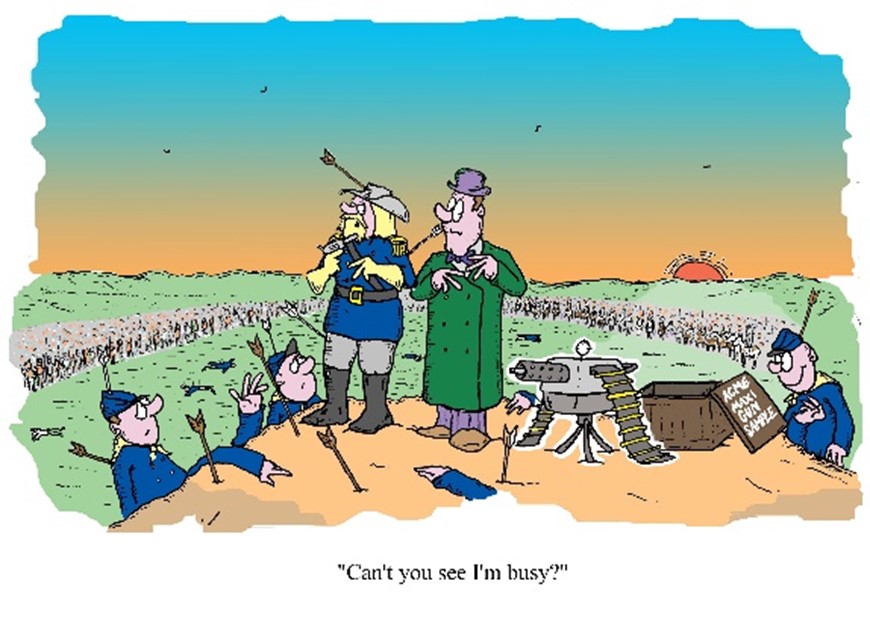
If you could spend an hour getting today’s work done or spend the hour making tomorrow’s work better (which includes making the work better for years to come), which would you do? If you are like most people, you think it would be smarter to spend the hour making the future better. You know that a little time spent today making the future better would return your investment many times over. You know that doing strategic work that improves yourself, your work, or others in some way is more valuable than tactical work. You know that achieving an improvement goal is better than merely doing that which needs to be improved.
However, if you are like many people, you are too busy to work on tomorrow. You’re like the military commander so busy fighting the enemy with bows and arrows that he doesn’t have time to talk to the machine-gun salesman. So, you continue to spend your time on that which needs to get done today rather than on that which makes tomorrow better.
Why do people spend their time doing work that is less valuable than the more valuable work they could be doing? Is it an inability to resist doing that which is most urgent? Or an inability to ignore distractions? Or the inability to say “no” to requests? Or have they been reactive to their circumstances so long they are unable to think strategically or be proactive? To be fair, people can’t always give attention to making tomorrow better. Today’s work has to get done as well. The real issue then is knowing and achieving the right balance of getting today’s work done with improving tomorrow’s work.
The most common reason people give for not doing something is “I don’t have the time.” Yet “not having time” is often more of a symptom than a reason. Everyone has some amount of time. When people blame time, they are essentially saying they choose to spend their time elsewhere. Or, they are saying they have no control of themselves or their circumstances. When people blame time, they are ignoring the deeper issue about their decision regarding where to spend their time.
If you are a “just get it done” person who focuses on what needs to get done today, you might be thinking “focusing on today is just my personality and who I am.” Or “I just like to check things off of my to-do list.” Or “I have a role that requires me to be focused on the tactical and immediate.” Yes, these might be true, but they are true for all of us. Yet some people figure out how to intercept their natural tendencies and challenge their circumstances. They override their inner and external influences to be more intentional. They invest time in achieving strategic goals that improve themselves, others, and their circumstances.
If you allocate time to “working on your business” instead of always “working in your business”, good job. If you continually develop your knowledge and skills, keep it up. If you allocate time to making lasting improvements to your circumstances and others, you undoubtedly experience the rewards of your investment. But if you tend to let today’s urgent, convenient, or fun displace tomorrow’s important, here are a few practices to consider:
- Take a break. Break your cycle that Albert Einstein referred to as “Insanity – doing the same thing over and over again and expecting different results.” Take a break and get off the treadmill of busyness as usual. Intercept the tendency to be overly reactive or tactical. Allocate time on your calendar for intentional thinking and reflecting. Consider what you are doing as well as what you are not doing.
- Assess what you’re doing. Determine your right balance for working on today vs working for tomorrow. Maybe you need to spend a few extra hours a month, week, or day improving what you do in some way. Create an inventory of both—what you need to do to sustain the work that needs to get done and the work you could do to make improvements.
- Select the areas that most deserve your intentional focus. Decide for yourself what needs your focus. It could be related to your self-improvement such as learning a new skill or gaining new knowledge. Or areas at work could be updating processes, utilizing new systems, or creating new offerings. Or building better relationships with family, friends, or coworkers. Or pursuing any goal that improves something at home, work, or for others.
- Secure your motivation. Become aware of the impact of pursuing the areas you’ve chosen. Know the benefits you could gain as well as lose. Recognize the problems that will continue if you don’t pursue the areas you’ve chosen. Know what you will continue to endure or cheat yourself out of by not being more intentional and strategic.
- Appreciate the bigger picture. Realize you can extract yourself from the urgent daily tactical activity and it will be okay. Maybe something gets delayed or ignored, but it’s okay compared to the benefits of the more valuable activity which you will be doing. If you think the world will stop spinning, realize it won’t. Consider that if you got hit by a bus and were in a hospital for a month, other people would fill in. Other people would learn. The work and the world would keep functioning.
- Become intentional. Move from knowing to doing. Commit time and effort to both—sustaining what has to get done as well as improving it. Become disciplined and in control of how you balance your time and efforts. Track your progress and enroll the help of accountability methods to maintain your commitment.
PDF version of this article: https://alpinelink.com/docs/Work_on_Today_or_for_Tomorrow.pdf.
